|


UK RRP £199.00 Inc V.A.T
Sparkle are becoming more well known within the consumer graphics
industry, they produce a massive array of graphics cards for the
PC industry, ranging from basic 4MB PCI cards right the way up to the
64MB GeForce3. The Sparkle GeForce3 has been around
for a while now and is probably one of the cheapest GeForce3's available.
It follows the Nvidia reference design to the letter, running at default
GeForce3 clock speeds of 200MHz core 460MHz memory. The card has a green
PCB and green heatsink's, it doesn't grab your attention like some
cards around at the moment, but in the end it is the performance
that counts. A quick look on the Sparkle
website shows a much funkier looking heatsink arrangement than
on the card pictured there. The Sparkle GeForce3 comes comes bundled with
the full version of PowerDVD, Driver CD v12.41 and of course a user's
manual. It is equipped with all the usual connectors, TV out and the DVI
interface which nowadays is becoming more widely used. The product is
backed up by a unique 1 year end user warranty and free web support.
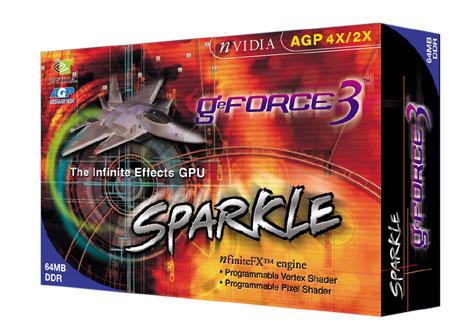
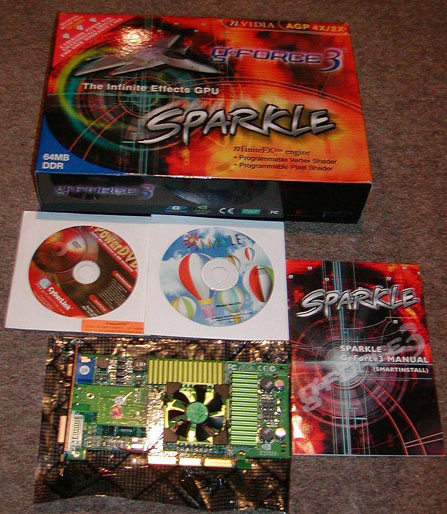

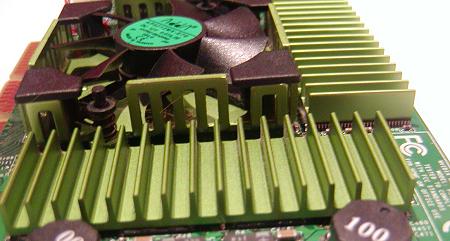
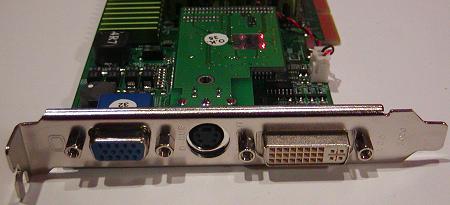

Specifications
| Features |
|
RAMDAC: 350MHz
Core Clock: 200MHz
Memory Clock: 460MHz
Memory Interface: 128 Bit
nfiniteFX engine for full
programmability
Lightspeed Memory Architecture for unmatched performance
Surface engine for high-order surfaces and patches
Programmable Vertex Shader
- Procedural deformations
- Programmable matrix palette skinning
- Keyframe animation interpolation
- Morphing
- Fog effects
- Radial
- Elevation
- Non-linear
- Lens effects
- Fish eye
- Wide angle
- Fresnel effects
- Water refraction
Programmable Pixel Shader
- Phong-style lighting for per-pixel
accuracy
- Dot3 bump mapping
- Environmental bump mapping (EMBM)
- Procedural textures
- Per-pixel reflections
HRAA-high-resolution antialiasing
- Featuring Quincunx AA mode
- Integrated hardware transform engine
- Integrated hardware lighting engine
- DirectX R and S3TC R texture
compression
- Dual cube environment mapping
capability
- Reflection maps
- Accurate, real-time environment
reflections
- Hardware accelerated real-time shadows
Performance
- 3.2 billion AA samples per second fill
rate
- 7.36GB/sec memory bandwidth
- Lightspeed Memory Architecture
amplifies memory bandwidth
- True, reflective bump mapping
- Z-correct bump mapping
- Phong-style lighting effects on bump
maps with reflections
High-performance 2D rendering engine
- Optimized for 32-, 24-, 16-, 15- and
8-bpp modes
- True-color hardware cursor with alpha
- Multi-buffering (double, triple or
quad) for smooth animation and video playback
High-quality HDTV/DVD playback
- High-definition video processor (HDVP)
for full-screen, full-frame video playback
of HDTV and DVD content
- Independent hardware color controls
for video overlay
- Hardware color-space conversion (YUV
4:2:2 and 4:2:0)
- Motion compensation o 5-tap horizontal
by 3-tap vertical filtering
- 8:1 up/down scaling o Per-pixel color
keying
- Multiple video windows supported for
CSC and filtering
- DVD sub-picture alpha-blended
compositing
Operating systems
- Windows 2000 , Windows NT4.0
- Windows 98, Windows 95
- Linux , Mac OS
API support
- OpenGL 1.2 and lower
- DirectX 8.0 Version 1.1 and lower
|
Test Rig
Athlon Thunderbird @1600MHz (12*266MHz)
Epox 8K7A +
256MB Crucial PC2100 DDR RAM
Sparkle GeForce3 64MB
SoundBlaster Live 1024
Windows 98SE with NVidia Detonator
21.83 Drivers
Benchmarks
For benchmarking I updated the driver's that came with this card to the
newer Nvidia Detonator drivers v21.83
3DMark 2001
This is the standard benchmark you see everywhere on the internet and in PC
magazine's nowadays. I have included all the current resolutions including
1600x1200 as games are becoming more playable at this very high
resolution.
| 3DMark
2001 |
640*480 |
800*600 |
1024*768 |
1280*1024 |
1600*1200 |
| 1600MHz |
8077 |
7708 |
7026 |
5743 |
4494 |

At 1024x768x32 the Sparkle GF3 scores 7026 3dmarks
which is on par with most of the GF3 flavour's available today.
Unreal Tournament
I've included UT as I just love the game and its still very popular in the
gaming world, although it doesn't really
serve much purpose as it is so heavily CPU dependant as you can see from the
results below. The FPS barely changes from the lowest to the
highest resolution.
| UT |
640*480 |
800*600 |
1024*768 |
1280*960 |
| 1600 |
124.13 |
120.69 |
117.45 |
111.26 |
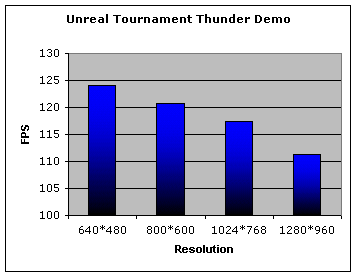
Quake3
This is the good old favorite graphics benchmark, I'm using the old version 1.17
Quake patch, so that I can use the standard timedemo001.dm3 demo. As
always I've run the game with a variety of settings. EHQ is with the
graphics settings maxed out with full eye candy. At 1600*1200 resolution the
FPS creeps down to under 100FPS, showing just how much Quake 3 needs
the memory bandwidth. Later in the over-clocking section you can see just what a
difference the extra memory bandwidth makes.
| Quake3 |
640*480 |
800*600 |
1024*768 |
1280*1024 |
1600*1200 |
| Fastest |
193.5 |
191.8 |
184.8 |
157.7 |
118.4 |
| HQ |
180.2 |
176.5 |
162.4 |
128.5 |
96.3 |
| EHQ |
175.6 |
171.7 |
153.2 |
115.3 |
83.6 |

Overclocking
Besides the features on the card the main
thing that separates one GeForce3 from another is the overclocking ability of it. Looking at the heatsinks on the Sparkle
card they didn't exactly fill me with confidence in
terms of overclocking ability, but the only way is to
try it out. I installed the well known 'Coolbits' registry file to allow overclocking
of the
core and memory. I quickly moved this up a few notches and ran a loop of 3DMark 2001 to test
stability. After a few loops of 3DMark, I got up to a an amazing 250MHz core 575MHz memory.
This is above the core
speed of the newer GeForce3 Ti500's and the memory speed is way above the default
setting of 500MHz for a GF3Ti 500.
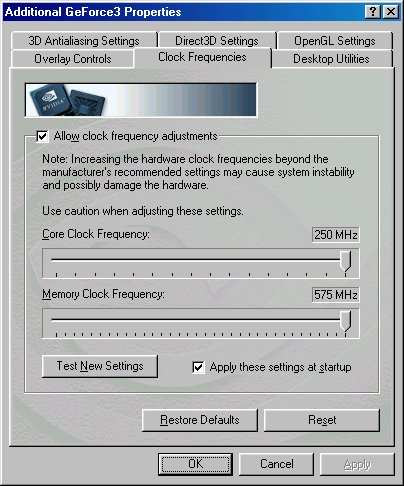
Overclocked Benchmarks
I ran all the benchmarks again with the card
clocked at 250MHz core 575MHz memory as shown above.
Since the Sparkle GF3 overclocked so well, lets see what it means in terms of
performance gain.
3DMark 2001
|
640*480 |
800*600 |
1024*768 |
1280*1024 |
1600*1200 |
| 1600 |
8077 |
7708 |
7026 |
5743 |
4494 |
| 1600OC |
8617 |
8345 |
7821 |
6785 |
5559 |
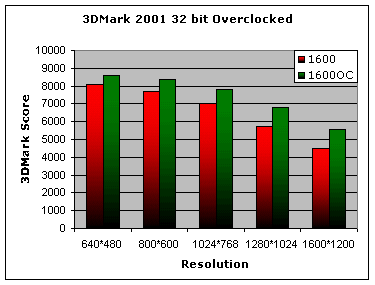
This shows quite a large performance gain over
the default core and memory speed. At 1024x768x32 resolution this reflects a 12%
performance increase.
Unreal Tournament
Not much of a difference here at all less than 1FPS
difference, truly showing that this game is very CPU speed dependant!
| UT |
640*480 |
800*600 |
1024*768 |
1280*960 |
| 1600 |
124.13 |
120.69 |
117.45 |
111.26 |
| 1600oc |
124.52 |
120.94 |
117.89 |
111.97 |
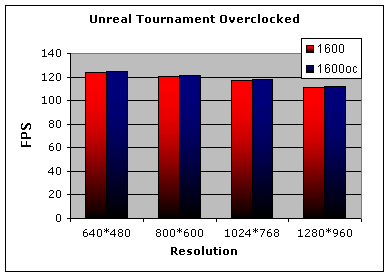
Quake3
I've decided to show the Quake3 results using just the Extra High Quality (EHQ) settings, this is with the sliders set to maximum quality. In the higher
resolutions there are some very impressive gains in performance, below
1024x768 there really isn't much difference though. Its the higher
resolutions that matter anyway because in the lower resolutions a
GeForce3 running at default speed does the job very well anyway!
| Quake3 |
640*480 |
800*600 |
1024*768 |
1280*1024 |
1600*1200 |
| EHQ |
175.6 |
171.7 |
153.2 |
115.3 |
83.6 |
| EHQoc |
175.6 |
174.1 |
164.6 |
136.1 |
104.4 |
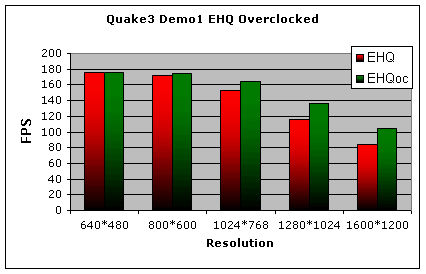
Conclusion
The Sparkle SP7000 GeForce3 ran everything I threw at it flawlessly
and performed very well. The card's looks are a little tame when compared
with some of the funkier looking GeForce3's around, but as I said before
its the performance that counts and this card certainly has plenty of
that. The standard GeForce3 GPU is being phased out at the moment to be
replaced the GeForce3 Ti500 and Ti200 cards, so there may well be some
cheaper deals on them at the moment, so if your'e after a powerful graphics
card that won't burn a huge hole in your pocket go out and grab one now!
|




























